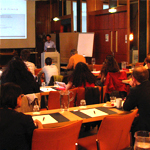Knowledge Is Power: Epistemic Communities And EU Crisis Management
-
-

-
Presentation speakers
- Giovanni Faleg, London School of Economics and Political Science
- Download presentation
Abstract:
Why and how do security institutions evolve? How has the European Union security architecture changed so rapidly over the past ten years, without member states agreeing on a common vision of European integration in this field? This paper engages the current debate on the evolution of the European Union’s Common Security and Defence Policy (CSDP) by investigating the role of knowledge and ideas in influencing further European integration. Current explanations – whether realist, functionalist or liberal – are underdetermining, since they don’t fully account for the process of almost permanent expansion and reform that institutions and procedures underpinning CSDP have undergone over the last ten years. I argue that these theories need to be complemented by a new approach merging constructivism and sociological institutionalism emphasizing the role of “knowledge” as a key intervening variable between structure and agency. Accordingly, my research demonstrates that national and transnational networks of experts have fostered institutional and policy learning by promoting new principled and causal beliefs, leading to new values and strategic prescriptions. From an empirical standpoint, this research focuses on the development of the EU crisis management structures and capabilities. Since the comprehensive approach to security has tremendously affected the current shape and activities of CSDP, locating its intellectual cradle and understanding how new security norms were diffused is pivotal to gain a clearer idea of the institutions that handle security matters in today’s Europe. While structural conditions after the end of the Cold War underpin the new strategic prescription of “comprehensive approach” or civil-military relations, the way communities of experts responded to these conditions and redefined the EU security interests is essential in explaining change at the institutional and policy levels. -
Related Presentations






















